- Home
- Danielle Paige
The Wizard Returns
The Wizard Returns Read online
CONTENTS
One
Two
Three
Four
Five
Six
Seven
Eight
Nine
Ten
Eleven
Twelve
Thirteen
Excerpt from Dorothy Must Die
About the Author
Books by Danielle Paige
Back Ad
Copyright
About the Publisher
ONE
Sometimes you just have to cut your losses, the Wizard thought, as the rolling green fields of Oz dropped away below his balloon. It had been a decent run: parties in the palace, everyone scampering to and fro at his command, all the banquets. One merged into the other now in his memory: the smeary blur of china platters and singing toast, pastries bursting into flames, wine pouring in waves down the sparkling white tablecloths without leaving a stain and hurling itself into goblets. But in the end none of it had ever been enough. There had been too many late nights in the dark of his vast chambers, staring down the bleak interminable chasm of the future; day after day, never changing, all the sycophants and toadies, the yammering masses, the damn monkeys—he shuddered, and closed his eyes against the memory. Never another monkey. The best thing he’d ever done in his entire tenure in Oz was sell them out to the Wicked Witch.
He closed his eyes. Who was he fooling? He didn’t want to go back to the Other Place. It was a hard step in the wrong direction, going from Wizard of Oz to the tired sidewalk con artist he’d been before he came here. The dusty streets of Omaha, that tired blue sky. The circus he had traveled with—its dispirited, jaundiced elephant; the aging aerialists in their shabby old costumes; the strongman, who could only manage barbells made of tin painted to look like iron. He might have detested Oz, but it had been a vast improvement over his old life. Its people, fools that they were, had thought he was a magician capable of anything. They had rushed to do his bidding. He’d been a king—and now he was nothing.
And he had the girl to thank for it.
That awful girl in her awful checkered dress and her whining, high-pitched voice. He had been quite content to rule the childlike citizenry of Oz until she came along with her little dog and revealed him for what he truly was: only a man like any other, though perhaps a little less kind and a little more clever than most. He’d left her standing in the courtyard of his palace, her mouth a round, astonished O as his balloon rose into the sky. He’d promised her a way home, but he’d never been one to keep his promises.
Now he leaned his head against the ropes of the hot air balloon, rough hemp scratchy against his ear, and looked carelessly out at the horizon. The Emerald City still sparkled on the horizon like a cheap necklace in the distance; far below, a golden plain gave way to a vast red field of poppies. But what caught his gaze were the storm clouds massing in heavy gray drifts. Even at this distance he could see their unnatural—though everything in this disgusting country was unnatural—sheen. Their staticky haze of magic, real magic, sparking across the roiling surface of the storm.
The clouds moved closer at a surreal pace, swelling like ink spreading through water, rolling across the sky until the clear summery blue was swallowed up in darkness. The cool breeze that had carried the balloon at a brisk clip away from the Emerald City picked up, gusts howling past his ears and jerking the balloon wildly until the basket swung madly below it like a yo-yo on a string and he was thrown against the ropes. A menacing rumble of thunder was followed by an earsplitting crack of white-purple lightning so close to the basket that he could feel his hair standing on end. The wind whipped at his clothes. In its fury he thought he could almost make out a taunting chorus of voices—but what words they snarled, or in what language they spoke, he could not have said.
Holding fast to one of the ropes, he struggled grimly to lower the burner, thinking he might try and safely land the balloon. Lightning snapped furiously and the wind swirled around in a terrifying vortex with the balloon at its heart, spinning him faster and faster like a top—but when he looked up from the burner he saw that the clouds that had streaked across the sky were gathered directly overhead. Past their edges, the sky was as clear and calm as it had been only moments earlier. Whatever this storm was, it wasn’t ordinary.
Perhaps this unexpected development was the chance he was hoping for: Oz wasn’t ready to let him go. Someone had sent the storm to keep him here.
Resigned, he settled back into the heaving basket, concentrating firmly on not being sick over its edge, and waited for the inevitable. It was only a matter of time before the balloon went down. With a grim sense of satisfaction, he watched as one particularly spectacular streak of lightning tore through the silk of his balloon, leaving a smoking rent that only widened as the wind pulled at it. With a slow, majestic shudder the balloon held for a moment, caught in an updraft, and then it began to plummet toward the sea of poppies below. As quickly as it had come upon him, the storm blew itself out like a birthday candle: the wind died, the lightning popped and vanished, and the clouds dissipated into faint gray wisps that dawdled off toward the horizon. One last gust cupped the balloon, buffering its fall to earth. “Please,” he said aloud, in the event he was being watched by whatever entity had sent the storm. “Just no more monkeys. It’s all I ask.” He could have sworn the gust snorted.
With a bone-jarring thud, the balloon hit the ground and bounced into the air once—sending poppies flying—before thumping down again. The Wizard was flung from the basket and went head over heels into the poppy field, tumbling through a rich red cloud of petals and at last coming to rest in a drift of seed heads and silvery-green leaves. He lay there for a moment, stunned, and then took stock of all his limbs. Nothing seemed to be broken, or even bruised. Whatever magical force had brought down the balloon had apparently had no intention of harming him. He sat up, and found that the heady smell of the poppies had induced a wonderful languor; his limbs seemed deliciously heavy. The golden sunlight poured over him like butter and his eyelids began to drift closed. He sank back into the poppies as if into the most decadent and luxurious of feather beds.
“I really should have tried this sooner,” he murmured, and then darkness took him.
TWO
“Wake up,” said an insistent voice in his ear. “It’s time.” He had no interest in doing so. He’d been having the most lovely dream, floating in a warm honey-scented bath while colorful balloons sailed by overhead and a beautiful talking lion sang lullabies in a voice that rivaled the great blues singers of his homeland. But the voice would not let him sink back into glorious oblivion. “I mean it,” it said, more firmly this time. “Wake up.”
He opened his eyes and found himself staring into a pair of uncanny emerald ones. Emerald. There was something about the color that he couldn’t quite put his finger on. His own eyes refused to focus properly, and he only wanted to go back to sleep, but the person in front of him was now tugging fiercely at his shoulder. “We have to get you out of here,” Emerald Eyes said. “You’re high as a kite.”
“Balloon,” he mumbled, allowing himself to be dragged along as the young man hoisted one arm over his shoulder and towed him through—where was he? His vision was improving a little; there was more color all around him, red and green, and overhead a lot of blue. A sky, he remembered. The thing overhead was a sky. He protested feebly as he was pulled away from the last of the huge red flowers, and dumped, unceremoniously, onto a grassy hillock. Emerald Eyes smacked him briskly on the cheeks, but when this did nothing to wake him up, heaved a sigh of disgust and let him go. “Nighty night,” he murmured, and drifted off into sleep again.
The next time he woke up, it was early in the m
orning, and the pleasant fuzziness had faded to a dull buzz. He was in a cornflower-blue field, under a bright blue sky. He sat up and looked around. A patch of fat pink flowers next to him was singing a cheerful high-pitched ditty. Two huge yellow-and-black butterflies fluttered lazily through the air, arguing halfheartedly about who was better-looking. Emerald Eyes was stretched out with his back against a nearby tree, watching him. “Good,” he said. “You’re awake. The poppies should be wearing off now that you’re out of the field. Do you know where you are?” Emerald Eyes cocked his head. “Do you know who you are?”
He considered the questions. There was the dream about the lion—but before that, everything was a hazy blur. He had a vague sense that flowers did not ordinarily sing and butterflies were not meant to talk, but that was it. “Not really,” he admitted.
Emerald Eyes looked at him for a long time. “You’re the Wizard,” he said finally. “Not that you were ever very good at being one. But we can’t call you that on the journey we’re about to take. You really don’t remember, do you?”
Wizard? He didn’t know anything about being a wizard. Something stirred in his memory. A card table—he’d sat at a card table and done sleight-of-hand tricks, and passed a battered top hat. A shabby one-room apartment that smelled of cabbages. His face in the mirror, sallow and pale, with dark circles under the eyes. A young face, but hardened and cynical. A brown suit with fraying cuffs, worn shiny at the elbows, and underneath it a stained white shirt with a collar that had long since lost its crispness. He shook his head violently, and the images dissipated into wisps of smoke. “I played tricks,” he said uncertainly.
Emerald Eyes laughed, and there was something in the sound that was almost bitter. Or cruel. “That you certainly did,” he said. “For the time being, let’s call you . . .” He trailed off, thinking, and then smiled. “Let’s call you Hex,” he said with a grin. “And you can call me Pete, though you used to know me as something else.”
“I did?” the Wizard asked. No. He wasn’t a wizard. This strange boy had just told him as much. Hex. His name was Hex now. He studied Pete closely, and something flickered at the back of his mind. A baby? A monkey? But then the flicker died down, and whatever he’d been about to remember was gone.
“You did,” Pete said, “but that was a long time ago. Do you have any idea how long you’ve been down for the count in that poppy field? Twenty-five years, my friend, give or take a few. You should be an old man by now. But as you know—or used to know anyway—time doesn’t move the same way in Oz that it does in your world. And time definitely doesn’t move the same way in the poppy field.” Pete sighed. “Kind of jealous, actually. A quarter century blissed-out nap sounds pretty good right about now. You wouldn’t believe how much work it took to get out of the palace—the only reason I could get away at all was because Dorothy is so wrapped up in whatever she’s up to with Glinda. Anyway, I’ve been sent to help you get home.”
“Sent? By who?” Hex thought more about what Pete had just said. The name Dorothy had set off a tiny alarm in his brain, though he wasn’t sure why. “Where is home, if it isn’t here?”
“The Other Place,” Pete said impatiently. “You were trying to get there when your balloon crashed. That’s where you’re from, and that’s where you belong. But you can’t cross the boundary between here and there until your memory returns. The fairies are the only people in Oz who can help you, which is why I’m taking you to them. But they won’t help you without getting something in exchange—and they’ll test you to make sure you’re worthy of their assistance.”
“Test?” Hex asked nervously. “What kind of test?”
“The Three-Part Test,” Pete said. “Wisdom, Courage, and Love. It’s part of your journey. I can guide you to the fairy kingdom, but you’ll have to pass the test on your own to prove your selflessness. The fairies won’t help you unless they believe it’s for the good of Oz.”
Test? Other Place? Fairies? What Pete was saying didn’t make any sense at all. And why did Pete care if he stayed here or went to what was supposedly his home? If he thought about it for too long his head hurt. “Why now?” he asked suddenly. “Why didn’t you just leave me to sleep?”
Pete pulled Hex to his feet, ignoring his protests. “It’s time to start walking,” he said. “No one will be looking for you, or expect to see you out here wandering around, but we can’t take any chances.”
“Why does it matter if anyone recognizes me?”
Before Hex even realized what was happening, Pete had taken hold of his face in both hands, staring deep into his eyes with his own uncanny green ones. “Hold still,” Pete said. “This might hurt.” He pushed his palms into Hex’s cheeks with a terrible cracking sound. The sudden flare of pain was overwhelming, and Hex uttered a muffled yell. He could feel the bones of his skull shifting as Pete’s hands—almost unbearably hot now—continued to push at his cheeks and jaw. His skin was burning; his scalp felt as though it might peel away from his skull in flayed pieces, his teeth as though they were crumbling in his jaw. Tears sprang to his eyes, and a flash of contempt crossed Pete’s face before he finally took his hands away. Hex sank to his knees, gasping for breath, and touched his face, afraid of what he’d find there. His skin was cool and ordinary to the touch. The agony lessened to a dull throb.
“I could have just glamoured you,” Pete said, “but this will last longer. I’d show you in a mirror, but I don’t have one—and anyway, you don’t remember what you looked like before. But trust me, no one in Oz is going to recognize you now.” Hex rubbed his jaw, wincing at the remembered pain. “You’ll need new clothes, too,” Pete added, tossing him a pair of pants and a shirt that he’d somehow summoned out of thin air and then pointedly turning his back. After a moment, Hex changed into the new clothes. They fit him perfectly. He carefully folded the clothes he’d been wearing and cleared his throat. Pete turned around again, and Hex handed Pete his old suit. Pete snapped his fingers, and the clothes disappeared.
“Thanks,” he said, and laughed. Pete looked at him in surprise.
“You’re welcome,” he said. “Let’s get going.”
Pete was already walking away from him, striding briskly through the tall, pale blue grass. Hex scrambled after him, his mind burning with questions. Why, after twenty-five years, had Pete woken him up now? Why did it matter if anyone recognized him? Who was Pete, and why did he call Hex a wizard? Who were the fairies, and why was Pete taking him to them? Hex stared at Pete’s back and sighed. It didn’t take a wizard to know his questions weren’t going to be answered anytime soon.
THREE
They walked through the pale blue fields for a long time, stopping briefly to eat some bread and cheese that Pete summoned out of thin air. (“That’s magic,” Pete said. “Not like the flashy tricks you used to do.”) Their shadows lengthened on the grass; by now it was late in the afternoon. Pete occasionally squinted up at the sun as if gauging their direction, but when Hex asked him about it he only laughed. “This is Oz,” he said. “The directions change all the time. I’m following the feel of the Old Magic—that’s what’s telling me where to go.”
“Old Magic?” Pete didn’t answer at first, and Hex thought he was ignoring the question, but after a moment, he shrugged.
“You really don’t remember anything, do you? The Old Magic is the lifeblood of Oz. The power that runs through this place and keeps it alive. It’s like a huge web that connects everything together. The people, the landscape, the animals, the palace—Old Magic flows through everything. Only the most powerful witches in Oz can tap into it. And the fairies, of course, because technically it’s their magic—but I don’t think even they truly understand how it works.”
“The fairies who will be testing me?” Hex asked.
“The fairies are the original citizens of Oz,” Pete replied, apparently content to continue his history lesson. “They were the ones who first crossed the Deadly Desert, long before Oz existed, and used their blood to give Oz
its magic and bring life to the desert. They created Oz out of the wasteland. Because of that, the fairies are the rightful rulers of Oz. There have been other guardians of the throne over the years, of course.” Pete shot Hex an inscrutable look. “But none of those rulers are legitimate unless they’ve been authorized by the fairies. Anyway, if anyone can help you get home, it’s the fairies.” He put a strange stress on the word “legitimate,” and Hex wondered what he was getting at. Fairies? Old Magic? It all sounded like a bad penny dreadful. He frowned. Penny dreadful. An image of a cheap, flimsy booklet, its cover printed in lurid colors, a fanged vampire leering over a cringing blonde girl in a low-cut dress. Something he’d once owned? He felt as though he were surrounded by a translucent but impermeable wall—he could almost see through to the other side, where his old self awaited him in his real life, memories intact. But every time he tried to reach out he crashed into a barrier as solid as glass.
He had stopped walking, trying to remember, and Pete was watching him with an unreadable expression that seemed almost sympathetic, in contrast to his previous hostility. “It must be strange,” Pete said. “Not knowing who you are.”
Hex struggled to keep hold of the memory, but it dissolved again into the blurry recesses of his mind. He felt almost queasy, and realized belatedly that the strange sensation was shame. “I wasn’t a very good person, was I?” he asked quietly.
Pete looked surprised. “No,” he said after a moment. “Not really.”
“Maybe it’s better I don’t remember,” Hex said. “Maybe I should just start over.”
Pete’s expression grew hard again. “Do you really think that’s how it works? You forget about all the bad things you did, and they just go away? The people you hurt still remember. They have to—” Abruptly, Pete stopped, as if he’d thought better of what he had been about to say. “Get moving,” he said gruffly. “We have a long way to go.”

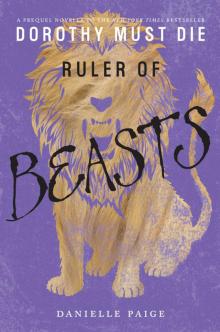 Ruler of Beasts
Ruler of Beasts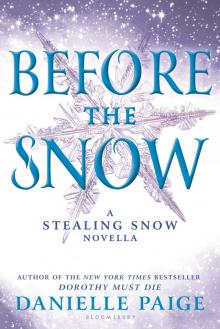 Before the Snow
Before the Snow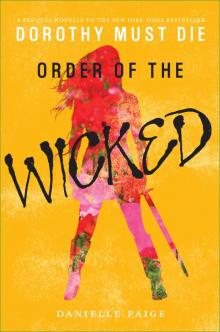 Dorothy Must Die Novella #7
Dorothy Must Die Novella #7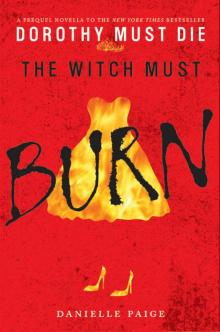 Dorothy Must Die Novella #2
Dorothy Must Die Novella #2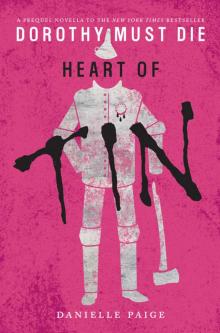 Dorothy Must Die
Dorothy Must Die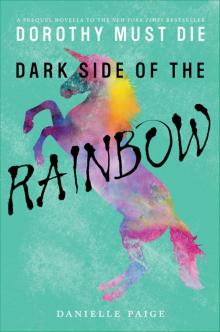 Dorothy Must Die Novella #8
Dorothy Must Die Novella #8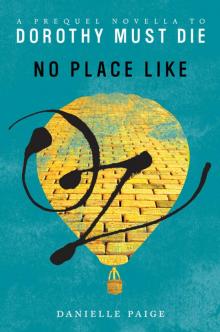 No Place Like Oz
No Place Like Oz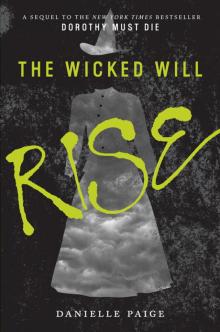 The Wicked Will Rise
The Wicked Will Rise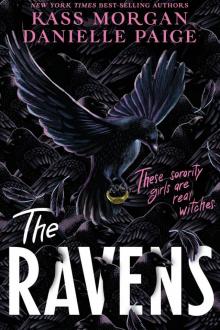 The Ravens
The Ravens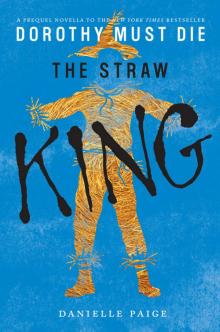 Dorothy Must Die Novella #5
Dorothy Must Die Novella #5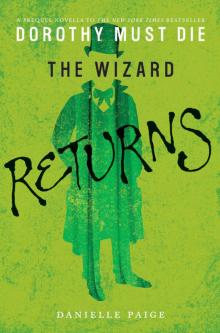 The Wizard Returns
The Wizard Returns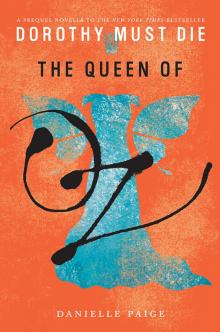 The Queen of Oz
The Queen of Oz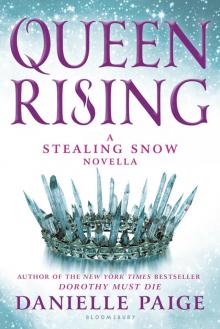 Queen Rising
Queen Rising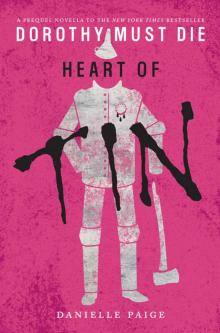 dorothy must die 00.4 - heart of tin
dorothy must die 00.4 - heart of tin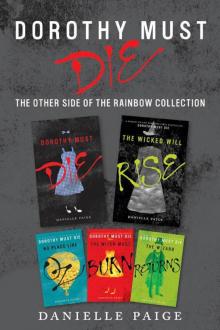 Dorothy Must Die: The Other Side of the Rainbow Collection: No Place Like Oz, Dorothy Must Die, The Witch Must Burn, The Wizard Returns, The Wicked Will Rise
Dorothy Must Die: The Other Side of the Rainbow Collection: No Place Like Oz, Dorothy Must Die, The Witch Must Burn, The Wizard Returns, The Wicked Will Rise